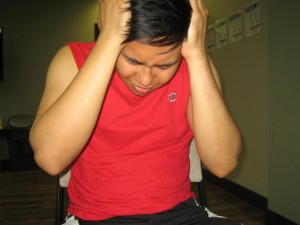Most cases of headaches in most individuals are tension headaches. This type typically arises every now and then, especially if under stress. It is not usually an indication of a serious health issue but can be intense and difficult to cope with.
Tension headaches can last from 30 minutes up to 7 days. If an episode occurs 15 days or more in a month over a 3-month period, it is considered chronic. This type can result to stress and depression that can lead to more episodes.
What are the causes?

Most doctors do not know for certain what triggers the tension headaches. It was once believed that spasms or tension in the neck, face and head muscles play a role. At the present, changes in the brain chemicals might also be a cause.
Tension headaches are the one of the usual types of headaches. It can be triggered by stress, hunger, depression and muscle strain. The headaches can occur abruptly or slowly.
Indications
The signs and symptoms of this type of headache include the following:
- Continuous but does not cause a throbbing sensation. There is pain or heaviness on both sides of the head.
- Pressure that feels as if the head is in a vise.
- Aching sensation at the temples or back part of the head and neck
It is important to note that tension headaches tend to recur, particularly when the individual is under stress. The pain is not usually severe and does not disrupt with daily activities but it can be intense or extended in some individuals.
Management
Many individuals can treat the tension headaches using over-the-counter pain medications such as aspirin or acetaminophen.
If these pain medications are used more than 3 times in a week, rebound headaches can occur. They occur after the medication has worn off which urges the individual to use another dose. In some cases, the doctor might prescribe medications for chronic tension headaches.
Preventive measures
Even with treatment, many individuals still experience some episodes of tension headaches. Home treatment that can help avoid the episodes include:
- Try to lower the stress levels
- Get enough sleep, exercise and stick with a regular eating schedule
- Practice good posture by sitting and standing up straight
- Avoid straining the eyes when using a computer
- Seek treatment for anxiety or depression
- It is recommended to use a headache diary to note down when headaches occur.
